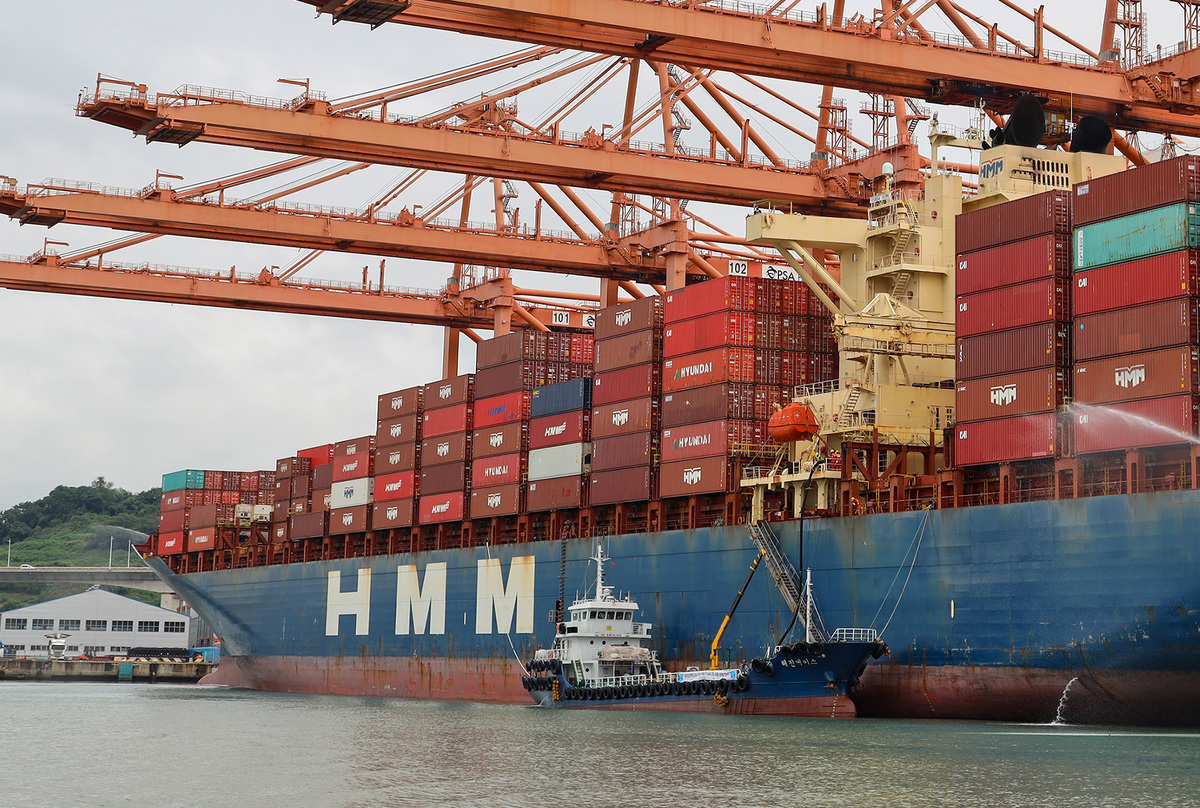Hellmann Logistics will claim CO2 reduction from lower-emission HMM voyages
German logistics provider Hellmann Logistics bought carbon credits or insets from HMM to claim a reduction in Scope 3 emissions, which are emissions across its supply chain.
 PHOTO: Bunkering of HMM TACOMA with biofuel sourced by GS Caltex at the Port of Busan. HMM
PHOTO: Bunkering of HMM TACOMA with biofuel sourced by GS Caltex at the Port of Busan. HMM
South Korean container line HMM, formerly known as Hyundai Merchant Marine, offers a low-emission shipment carbon insetting programme. The company gives its customers the option of purchasing carbon credits for their shipments, which are equivalent to shipments made on HMM's biofuel-fuelled vessels.
As part of the programme, the carbon credits saved by some of the HMM vessels that burn B30 biofuel blends are infused into the programme. The B30 blend consists of 30% biofuel derived from used cooking oil methyl ester (UCOME) and 70% HSFO. Using the mass balance principle, HMM allocates credits equivalent to the amount of greenhouse gas (GHG) emissions saved through the use of the B30 blend on its vessels to Hellmann Logistics.
In this context, the mass balance principle refers to the accounting method used to track and allocate the GHG reduction equivalent of biofuel usage among HMM’s ships. This indicates that its customers can buy carbon credits from HMM even if their shipments are made on HMM’s fossil-fuelled vessels, due to the mass-balance concept.
“Due to mass balance concept, customers can reduce their Scope 3 GHG emissions regardless of the transport service of which actual customer’s cargo is onboard. In other words, no physical connection to the ship is required and customers still can claim to benefit of lower emissions,” it said.
The companies have not disclosed how much biofuel Hellmann Logistics has bought credits for or how many of HMM's vessels are currently running on biofuel.
Energy insetting – a double-edged sword?
Classification society Bureau Veritas (BV) highlighted “energy insetting” as one of the complementary measures that can help to “stimulate the production of renewable and low-carbon fuels by sending clear signals throughout the value chain.”
This will help bridge the price gap between fossil and alternative fuels in the long-term, BV argued.
In addition, a number of shipping companies and fuel suppliers are actively promoting carbon insetting as a means to claim emission reduction. Some of these companies include container shipping giant A.P. Moller-Maersk, tanker operators Norden and Stolt-Nielsen and fuel suppliers Chevron and GoodFuels.
Shipping trade organisation BIMCO has also removed the term “insets” from its updated climate change glossary for 2023, underscoring its potential role in CO2 reduction and distinguishing it from offsets. This pertains to all neutrality and net zero definitions, including neutral and net zero ship operations.
However, some organisations, including the UN, have questioned the legitimacy of claiming emission reductions from measures like insetting.
“Since the adoption of the Paris Agreement in 2015, an increasing number of companies have pledged to reduce their greenhouse gas emissions to net zero - a level where any remaining emissions would be absorbed by forests, the ocean or other 'carbon sinks.' However, those claims are often based on questionable plans, including emissions offsetting and 'insetting' – rather than actual emission cuts,” the UN said in a greenwashing report.
Companies' emission reduction claims should be disallowed “when they involve offsetting, ‘insetting’, or any other method purporting to ‘neutralise’ or counter-balance emissions, rather than cutting them,” Belgian non-profit Carbon Market Watch said in a report last year.
By Konica Bhatt
Please get in touch with comments or additional info to news@engine.online






